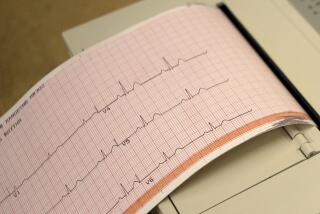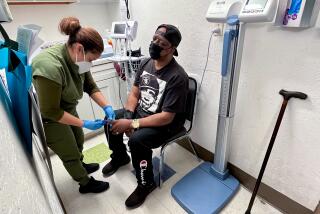Reliability of Heart Valve Test Disputed
- Share via
IRVINE — A device that may be able to detect potential life-threatening defects in mechanical heart valves manufactured by Shiley Inc. has been kept from the market because the government says more tests are needed before it can be approved for that use.
Illinois scientist Gerald A. Kien contends that a computerized device he invented can detect changes in the sound of a Shiley heart valve that is at high risk of failure. He said he has been frustrated by the government’s refusal to approve the device.
Kien points to results of a study published in the American Journal of Cardiology that found that the device can detect a particular condition that some Pfizer employees have said causes the valves to fail.
The development of an effective diagnostic tool would be important for about 55,000 people worldwide who still have Bjork-Shiley mechanical valves in their chests.
“If something like (a diagnostic device) were developed, it would be a wonderful thing,” said Brian Wolfman, spokesman for Public Citizen, a Washington-based consumer advocacy group.
Irvine-based Shiley, a subsidiary of Pfizer Inc. of New York, withdrew the valves from the market in 1986 after defective welds were blamed for deaths around the world. The FDA estimated that, as of early July, 395 Bjork-Shiley valves have fractured, resulting in the deaths of 252 people.
FDA officials acknowledged Wednesday that the test results described in the October edition of the Journal of Cardiology show that Kien’s device, called Valve-Tracker II, may be able to detect problems with the closing of the Shiley valve. But they said the data does not prove that the device can predict that the metal hinges holding the valves in place, called struts, will fail.
“The article presents evidence to show that this device detects valves with severe bimodal closure, but it doesn’t answer the key questions concerning whether bimodal closure is the only cause of strut fractures and is a valid predictor of heart failure,” FDA spokeswoman Susan Cruzan said.
However, a story Wednesday in the Wall Street Journal about the Shiley valve cited contrary testimony by Richard L. Martin, an engineering product manager at Shiley from 1980 to 1984. The testimony was contained in a 1987 deposition that is under court-ordered seal, the Journal said.
In his testimony, Martin said bimodal closure is an abnormal closing of the valve that puts “10 times higher than expected stress” on the strut. “It was practically a sure thing that the valves would break if they exhibited this condition.”
According to Cruzan, “the FDA was unable to confirm that abnormal closure would predict fractures.” She said the agency dropped its own testing program after Shiley would not provide a sample of valves manufactured during the period when they were most likely to fail.
Instead, she said Shiley has agreed to research a method to predict strut fracture and report its findings to the FDA. But so far no proven method has been found, Shiley said Wednesday.
William Letzing, the FDA’s heart valve expert, said the agency fears that if the diagnostic device is approved before it is proven effective, doctors might perform unnecessary surgery on patients to replace good heart valves. Such surgery could pose up to a 10% risk of death, he said.
Kien, however, said the Valve-Tracker II should be just one of several tools doctors use to decide whether surgery is necessary to replace a potentially defective valve.
FDA officials said Kien received approval to market the device “to diagnose abnormal blood flow through the heart.” But Kien is not allowed to market it for heart valve diagnosis.
Kien contends that the FDA testing requirements were virtually impossible to meet. “We were asked to demonstrate (that the device could diagnose) every mode of valve failure for every kind of valve of every size,” he said.
Because of the stringent FDA requirements, Kien and several business associates, who invested $3 million in development of Valve-Tracker II, decided last year to drop plans to market the device. Kien currently works as chairman and chief executive of Sun Electric Corp., a Crystal Lake, Ill., manufacturer of automotive diagnostic equipment.
Several years ago, Kien said about 15 of the valve diagnostic devices were distributed to some of the nation’s top cardiologists for test purposes.
Dr. Roy Jutzy, chief of cardiology at Loma Linda University Medical Center, said Wednesday that he successfully used Kien’s device as an initial screening procedure to detect valve malfunctions until he learned the FDA had rejected it. “We felt we could no longer use it,” he said.
Shiley on Wednesday supported what it called “the FDA’s careful approach to the approval of devices intended to predict failures of implanted heart valves.”
Dr. Roger Sachs, the company’s medical director, said in a prepared statement: “Because of the extremely low risk of valve failure, compared to the much larger risk of . . . surgery, it is vitally important that any testing device be thoroughly evaluated to ensure an acceptably low level of false positives.”
More to Read
Inside the business of entertainment
The Wide Shot brings you news, analysis and insights on everything from streaming wars to production — and what it all means for the future.
You may occasionally receive promotional content from the Los Angeles Times.










